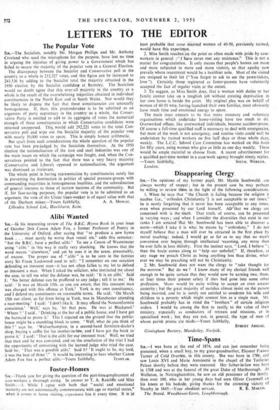LETTERS TO THE EDITOR -
The Popular Vote
Sta,—The Socialists, notably Mr. Morgan Phillips and Mr. Anthony Crosland who used the microphone for the purpose, have lost no time in arguing the injustice of giving power to a Government which has failed to secure the majority of the popular vote in a General Election.
The discrepancy between the Socialist and Conservative poll in the country as a whole is 212,327 votes, and this figure can be increased to 243,536 by adding to the Socialist total the majority obtained in the 1950 election by the Socialist candidato at Barnsley. The Socialists would no doubt agree that this over-all majority in the country as a whole is the result of the overwhelming majorities obtained in individual constituencies in the North East and in South Wales. Nor would they be likely to dispute the fact that these constituencies are unusually homogeneous. If, then, this preponderahce is to be admitted as an argument of party supremacy in the, country as a whole, the Conser- vative Party is entitled to add- to its aggregate of votes the numerical strength of those constituencies in which Conservative candidates were returned unopposed. This. would add 292,221 votes to the total Con- servative poll and wipe out the Socialist majority of the popular vote with nearly 50,000 votes to spare. This is simply honest arithmetic.
But apart from such considerations the whole question of the popular vote has been pre-judged by the Socialists themselves. At the 1950 election the nationalisation of the iron and steel industries was one of the main issues on which the campaign was fought, and, when the Con- servatives pointed to the fact that there was a very heavy majority (Conservative and Liberal) opposed to nationalisation, the argument was dismissed as irrelevant.
The whole point in having representation by constituencies surely lies in preventing the domination in politics of special pressure-groups with commanding majorities in homogeneous localities, and the subordination of general interests to those of narrow sections of the community. But if, for face-saving purposes, the popular vote is to be admitted as an argument, the vote of the Ulster linen-worker is of equal value with that of the Durham miner.—Yours faithfully, A. A. MOWAT. Lillesden School Ltd., Hawkhurst, Kent.


































 Previous page
Previous page